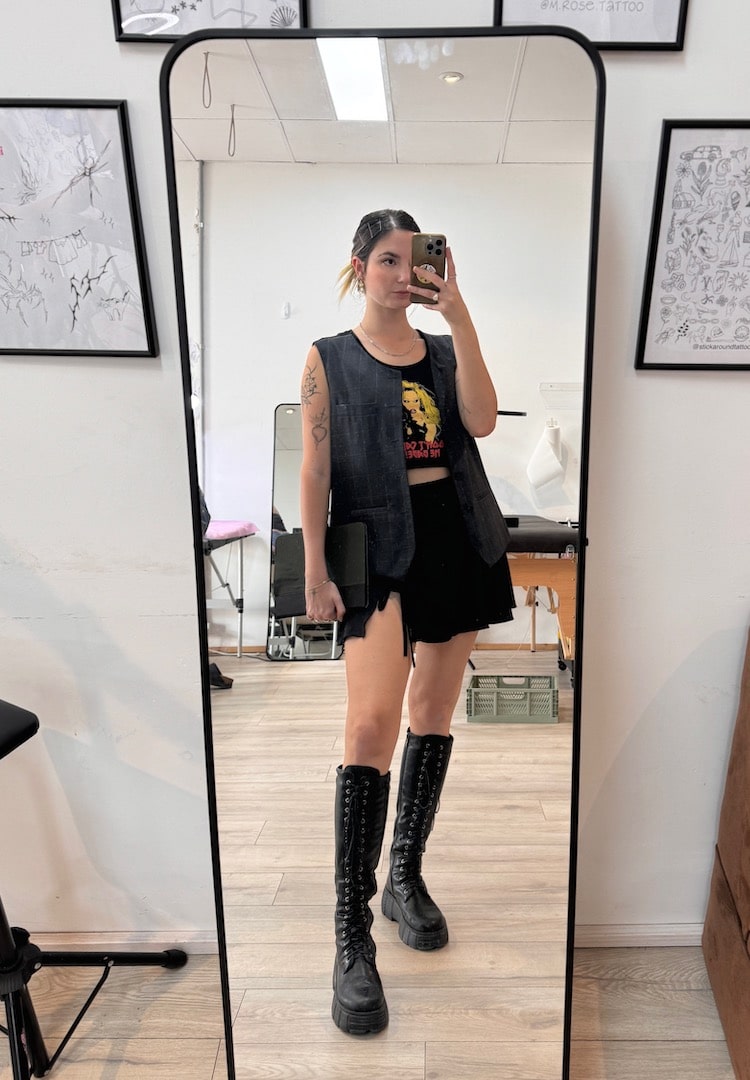How dialectical behavioural therapy made me a better professional
IMAGE VIA BLANCA
WORDS BY Asheda Weekes
Being ‘good at communication’ needs to go deeper.
I hit another roadblock. My psychologist’s empathic eyes and sage advice were telling me our monthly sessions over the last six months lacked the progress we hoped for.
She suggested the idea of doing more intensive therapy – weekly, in fact – to put in the time to see any true change. I furled into a ball on the couch, arms wrapped around my body and my leg shaking in irritation. I shot her a look: that’s out of the question.
Interested to hear how others navigate the world? Head to our Life section.
We had been here before. We probably visited this conversation once a year in the last half-decade. Each time I brushed it off because the trajectory of my success could not be put on hold for therapy. This doesn’t fit with my uni schedule… I just started my first full-time job… I just got a promotion… I just don’t have time.
Perhaps you could say I was going through a quarter-life crises that year. In 2019 I went on a solo trip overseas, quit my job, quit my housemate, moved back to the family farm, got a new job, bounced back and forth between the countryside and the city, got back together with my partner after a year’s hiatus, and once again, was flailing at full-time work.
It was an incredibly exhausting and lonely year for the most part. But it was also the year that led me to say yes to dialectal behavioural therapy (DBT). The thing was, the point of moving home was to help slow things down. And it didn’t work. After six months, the crossroads stood there abrasively. After all, my family home was the place where the darkest moments of my mental health manifested as a teenager – adjustment disorder, depression, anorexia.
As much as I love my family, and I love the home that’s been built there, living there made me fold into that headspace again. So I began the research on intensive therapies available in Melbourne. Like a peace offering, I presented them to my psychologist, showing her that I was ready to commit my time to move forward again.
Fast forward six months and a long-awaited appointment with a psychiatrist, I was finally referred to a DBT program. On most Mondays for the next year, I would be sitting at a round table with others ready to spend the day deep-diving into the inner workings of our anxieties.
Unfortunately, it was 2020. And I moved back to the city. So this turned into a weekly Zoom call instead which kicked off on the cusp of Melbourne’s first lockdown. I saw it as a blessing in disguise – all that time I thought I didn’t have, I now had plenty of it.
DBT is a psychotherapy treatment that provides skills-based learning to manage anxiety and is usually intended to help those diagnosed with borderline personality disorder. DBT aims to teach participants how to manage emotions, relationships and crises effectively with a range of strategies.
It uses change and acceptance-focused approaches, generally with dialectal dialogue to tease out the why. Key areas include mindfulness, emotional regulation, interpersonal effectiveness and distress tolerance.
The sessions were laborious and slow, particularly with the accumulating Zoom fatigue and subdued trauma of lockdown life. It was emotionally draining replaying my failures from all facets of my interpersonal relationship history. One particular eye roll moment was seeing the ‘strong communication skills’ on my resume.
I was doing well at connection, but as a people-pleasing avoidant perfectionist, my communication skills were only at surface level. But through DBT, I was able to identify when my anxiety was hindering my professional growth.
Minor mistakes like forgetting a daily task made me ashamed. Bigger mistakes like overspending client money left me wallowing for days. Failing certification training petrified me. Disappointment from bosses? Even more so. Taking a phone call would make my heart skip. Asking for leave made my stomach drop. Performance reviews? No thanks. Presentations? Let me write one, you present. I wanted to become so small that inadequacy couldn’t brush up against me, and so I didn’t let anyone down.
Face-to-face opportunities to implement my shiny new strategies were limited, but I still had the perfect chance to navigate a professional conflict in the digital workplace. DBT was a saving grace when the accumulation of COVID, lockdown, lost income, financial hardship, low morale, poor communication and a change in leadership had left me and my team rife with exhaustion. Putting strategies into practice allowed me to cope better than I anticipated, and move through it with a sense of clarity.
Toward the end of 2020 I was consuming a lot of career content, observing how that trajectory of individual success is still a hot topic. We all want to know how to do it. As I was listening to the podcast catalogue of Lady-brains, I noticed the key take-outs from successful female founders weren’t too far off what I had been absorbing in these weekly DBT sessions.
There’s no magic trick – it’s just unpacking what ‘effective communicator’ and ‘loves collaboration’ really means when you slap it on your resume. Even though there’s far more grit to these, they’re a great starting point if you’re struggling with similar situations.
Active listening
This is more than putting your phone away. For me, I have a tendency to let my mind wander and my eyes go off into the distance. I can fidget and look disinterested. It wasn’t because I was bored or trying to be rude – it’s usually my underlying anxiety bubbling away.
The best way to explain active listening is that it’s like mindfulness, but instead of guided meditation, you’re getting real-world info instead. So once the phone is popped away, share eye contact, look interested and observe. Make the right facial cues and respond to the information being shared with you. Pay full attention to who is in front of you.
Cope ahead
I must admit, I still have phone call anxiety. It doesn’t matter if you’re a stranger or not. I most likely won’t pick up unless you give me a heads up. It’s the writer in me. But unfortunately, the world moves much quicker with a phone call, and for that, I’ve been slowly practising the cope ahead method.
I prepare. I go to a quiet spot. I run through the things I’d like to say. I imagine the conversation and rehearse it. I rehearse possible outcomes – possible thoughts, feelings, further problems. I rehearse until I feel prepared. It may seem a bit over the top for a quick little phone call, but for me to get from heart-dropping panic to some kind of composure is huge.
Give and receive validation
Validation is about finding the kernel of truth in another person’s perspective. It’s acknowledging what they’re experiencing but it doesn’t mean you have to agree with them. One of the most common culprits of workplace conflict is invalidation.
The best way to approach this is using active listening. Reflect back on what they’re saying, observe their body language, acknowledge what they’re saying and don’t ‘one-up’ or ‘one-down’ them with your own personal anecdote (especially when it wasn’t asked for).
Opposite action
This strategy is similar to that saying “It’s all about mindset”. It encourages you to act in an opposite way to how you are feeling (and thinking) in a situation. It’s about throwing all your energy and focus into doing the opposite of what you actually want to do. This works best if the emotions you are experiencing do not fit the facts of the situation at hand, like feeling unbearably anxious about a simple phone call.
By acting the opposite of how you feel, which in the example of the phone call would be confident and secure, and by doing the task that makes you fearful, you can decrease the intensity of your emotions. In time, this will help you develop better coping skills.
This year has been a change of pace from the last. Lockdowns come and go but my career has side-stepped and flipped in a way that’s made my heart glow. DBT didn’t just help with these everyday skills – it increased my confidence, allowing me to step away from the marketing roles I was forcing myself to fit into for the last five years.
For the last six months, I’ve had the pleasure of finding joy in freelancing and getting to know what I actually want to do. I get to work with words all day as a copywriting project manager and writer.
Even though I hit smaller roadblocks now and again, that time carved out of my week focusing on DBT has made a notable difference when it comes to managing my BPD. Taking a deep dive into how we view communication skills was incredibly valuable. I’m able to recognise my reactions and mistakes, then bounce back quicker.
You don’t need DBT to be a better employee, contractor or leader. But these soft skills will let your professional anxieties ease up when it comes to your working relationships.
If you or someone you know is struggling with their mental health, you can contact Lifeline on 13 11 14.










